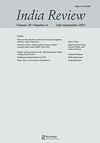Economic nationalism and India-US trade relations during the Modi-Trump years
IF 0.6
3区 社会学
Q3 AREA STUDIES
引用次数: 0
Abstract
ABSTRACT While India and the United States’ relations on the strategic and political fronts improved during 2017–2020, trade relations between the two countries noticeably worsened. Ever since their relations began to improve in the 1990s, deep divisions have existed between the two on trade issues such as market access in goods and services, intellectual property rights, and industrial policy. Given the focus on their strategic relations, successive administrations sought to manage these economic differences without public escalation of conflicts. The Trump administration’s approach deviated from this practice. While it continued to use the multilateral trading system to resolve some conflicts, it also resorted to using public shaming, tariff escalations and withdrawal of concessions in its relations with India. Although the Modi administration’s trade policy was similarly nationalist, its response to US actions were cautious. Evidence from the Modi-Trump period (2017–2020) shows that while both nationalist leaders pursued protectionist policies, the power capabilities of the states they led and the level of mutual economic dependence shaped their actions, their choice of instruments, and their ability to compel change in the other’s policies.莫迪-特朗普时期的经济民族主义和印美贸易关系
2017-2020年,印度和美国在战略和政治领域的关系有所改善,但两国的贸易关系明显恶化。自上世纪90年代两国关系开始改善以来,两国在商品和服务市场准入、知识产权和产业政策等贸易问题上一直存在深刻分歧。鉴于两国的战略关系备受关注,历届政府都试图在避免冲突公开升级的情况下处理这些经济分歧。特朗普政府的做法偏离了这一做法。尽管中国继续利用多边贸易体系来解决一些冲突,但它也在与印度的关系中采取了公开羞辱、提高关税和撤回让步的手段。尽管莫迪政府的贸易政策同样带有民族主义色彩,但它对美国行动的回应是谨慎的。莫迪-特朗普时期(2017-2020年)的证据表明,虽然两位民族主义领导人都奉行保护主义政策,但他们领导的国家的实力和相互经济依赖程度决定了他们的行动、他们对工具的选择,以及他们迫使对方改变政策的能力。
本文章由计算机程序翻译,如有差异,请以英文原文为准。
求助全文
约1分钟内获得全文
求助全文

 求助内容:
求助内容: 应助结果提醒方式:
应助结果提醒方式:


